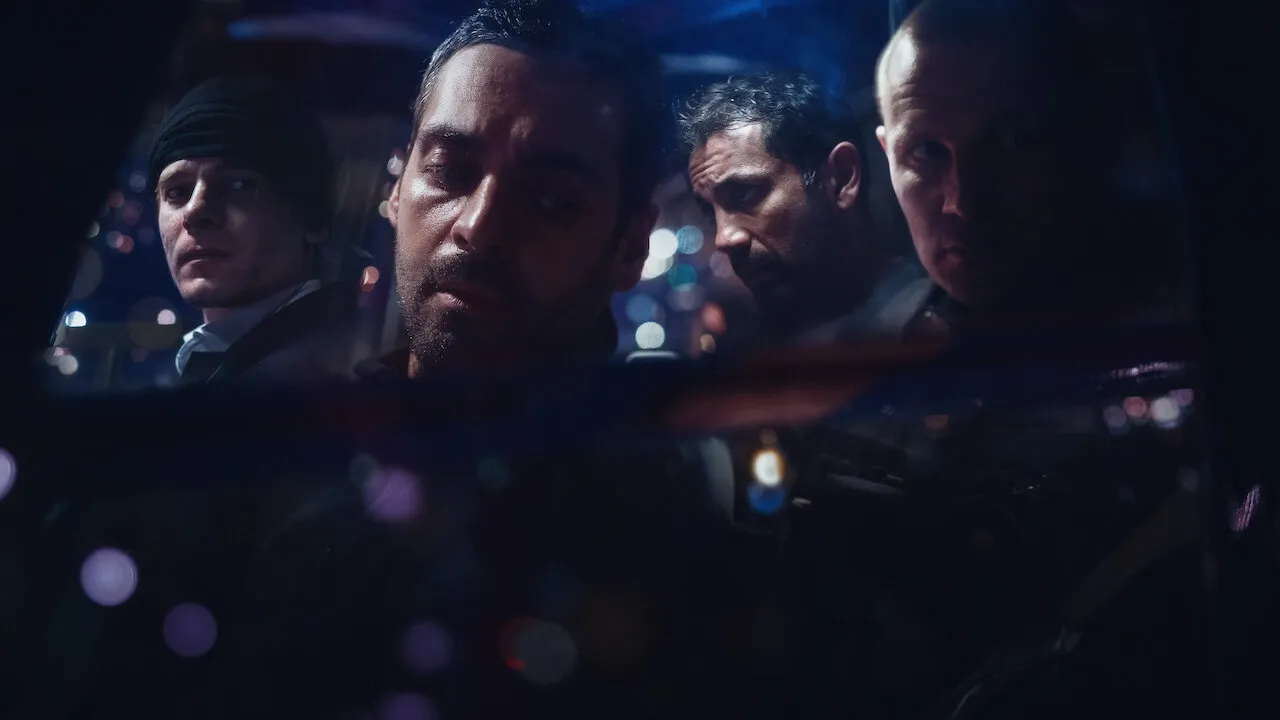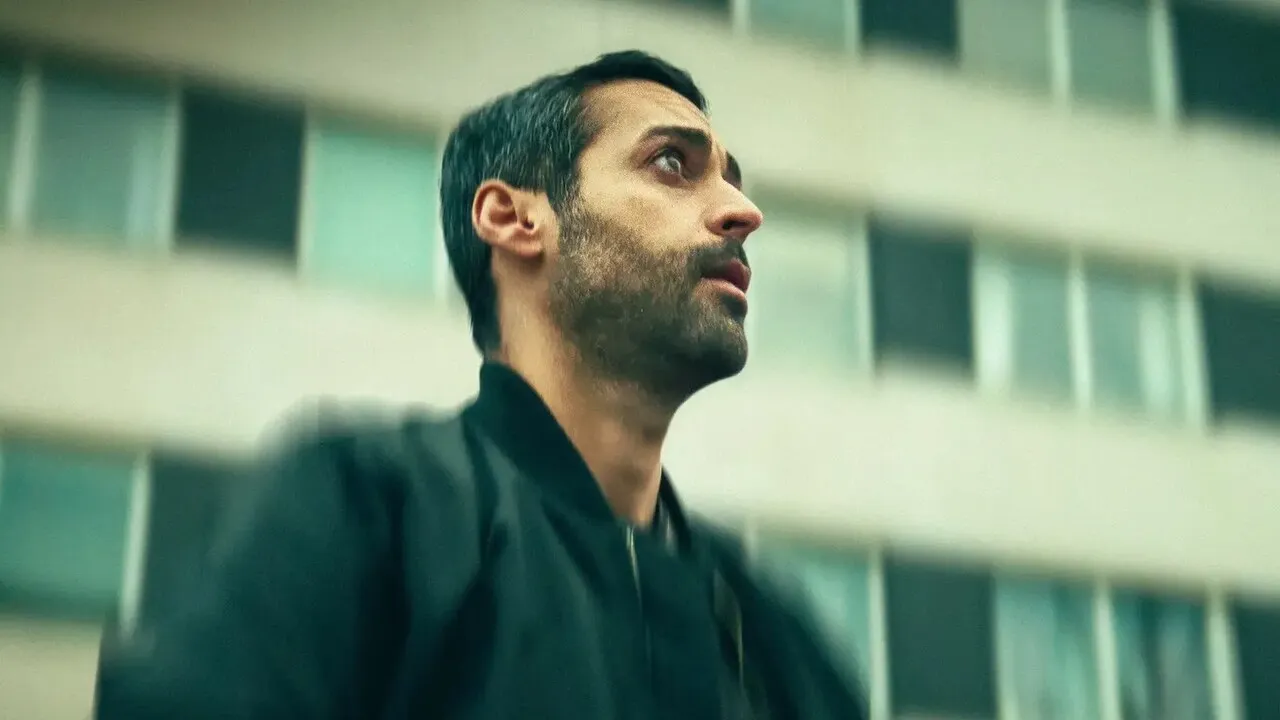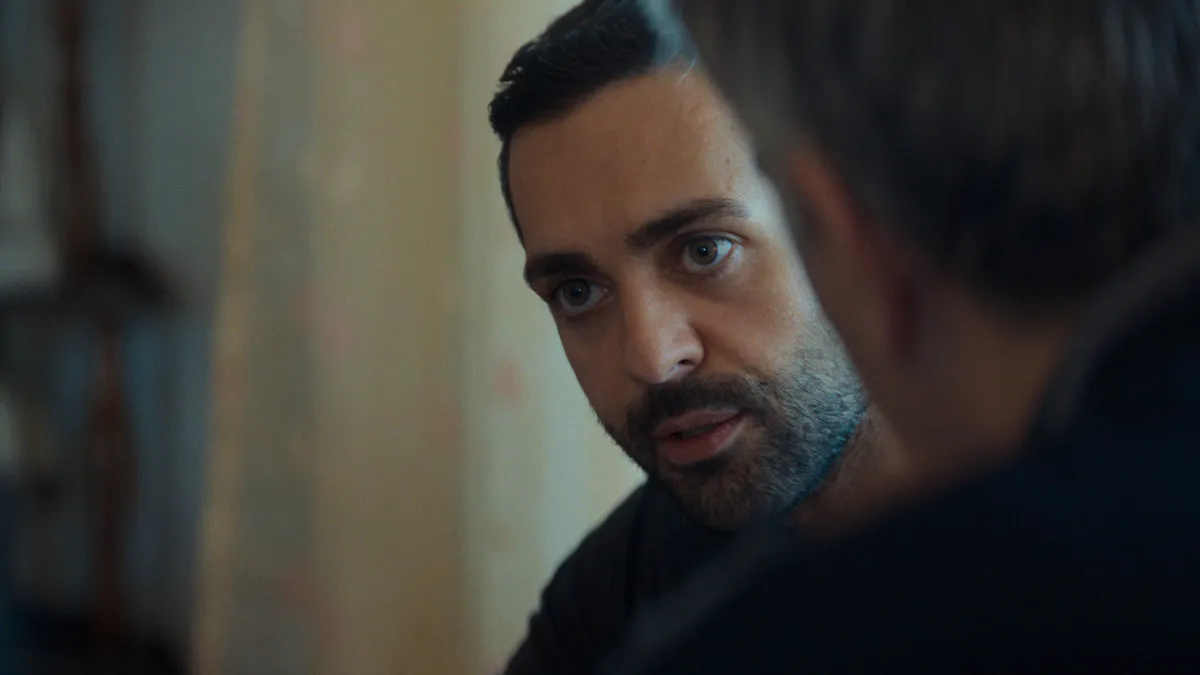The Helicopter Heist is an engrossing Netflix series that transforms a true-life Swedish robbery into a heart-pounding narrative of desperation, friendship, and high-stakes crime. Set against the backdrop of Stockholm’s criminal underground, the show reconstructs the infamous 2009 Västberga helicopter robbery, a heist that gripped Sweden and became a criminal legend.
This gripping series revolves around two childhood friends, Rami and Michel, whose lives are tightly intertwined by a shared history of small crimes and complicated personal struggles. Rami, now a family man attempting to shed his criminal past, finds himself in financial trouble following a failed business effort. Michel, the archetypal mastermind, represents the enduring draw of their criminal past.
The eight-episode series, crafted by Ronnie Sandahl and Daniel Espinosa, methodically deconstructs the planning and execution of an unprecedented robbery. More than just a crime thriller, it’s a complex examination of survival, friendship, and the razor-thin line between respectable ambition and criminal desperation.
What distinguishes The Helicopter Heist is its unflinching examination of the underlying motivations driving spectacular criminal acts. It’s not simply about the robbery; it’s about the intricate web of relationships, economic pressures, and personal decisions that lead ordinary individuals to extraordinary measures.
The narrative nuancedly assesses characters caught between society’s expectations and personal survival rather than glorifying the criminal deed. As a dedicated husband and father torn between the temptation of a potentially life-changing heist, Rami’s internal turmoil serves as the series’ emotional center, leaving viewers sympathetic but ambivalent about his decisions.
With its brutal documentary-style approach and in-depth character profiles, The Helicopter Heist is more than just another crime drama. It’s a fascinating human narrative about the fine line between desperation and opportunity, packaged in the exhilarating package of a meticulously planned robbery.
Turbulent Trajectories: Unraveling Criminal Destiny
The Helicopter Heist weaves a complicated narrative that defies standard storytelling, transporting viewers to a realm where time is as fluid as the characters’ moral boundaries. We first meet Rami in the pleasant, sun-drenched setting of Punta Cana, Dominican Republic, three weeks after a heist that will define his life’s most pivotal point.
The plot twists backward, illustrating Rami’s complicated trajectory from a petty young shoplifter to an aspiring legal businessman. Based on their common immigrant experience, his partnership with Michel represents more than just criminal collaboration; it is a bond formed through survival and cultural marginalization.
Rami’s future appears to be bright. He is married to Karin, has two children, and works as a cook while pursuing his dreams of starting a food distribution company. But fate has different intentions. A bad investment has left him financially devastated, owing money not just to his dubious father-in-law but also to dangerous criminals who will not forgive easily.
Enter Michel, the ultimate criminal mastermind. His arrival reawakens Rami’s buried criminal instincts. The helicopter heist becomes their ultimate goal, requiring accuracy and courage from a 20-person crew that includes a businessman named Zoran and a jittery helicopter pilot, Axel.
The series dissects the psychological landscapes of people who have been pushed to extremes rather than just chronicling a robbery. Rami is not shown as a normal criminal but as a multifaceted character torn between familial responsibilities and the allure of high-stakes adventure.
As the narrative progresses, viewers observe Rami’s meticulous planning, rising tension, and the unavoidable collision between his criminal past and genuine goals. The helicopter heist is more than just a criminal act; it represents a symbolic flight from economic desperation to an uncertain salvation.
Shadows of Survival: The Human Landscape of Criminality
In The Helicopter Heist’s multilayered world, characters emerge as multifaceted beings fashioned by circumstance, desperation, and survival rather than simple criminals.
Rami is the narrative’s emotional center, a man who is always torn between two worlds. His transformation from petty criminal to aspiring restaurateur represents a significant attempt at redemption. He embodies the typical transition narrative, married to Karin and with two young sons. However, beneath the appearance of normalcy, an insatiable tension exists. Rami is inextricably drawn back into the criminal world when a terrible business investment threatens everything.
Michel is the gravitational center of Rami’s criminal identity. He’s the quintessential genius, charismatic and calculating, who sees crime not just as a means of survival but as an art form. His relationship with Rami is more than just a collaboration; it’s a fraternity formed through common immigrant experiences and childhood survival skills. Michel doesn’t just propose the heist; he reignites Rami’s dormant passion by offering criminality as an exciting alternative to boring economic struggle.
Karin represents more than just a devoted wife. She is Rami’s moral compass, believing in his ability to achieve real accomplishment even when the conditions appear overwhelming. Her character embodies both hope and quiet skepticism, recognizing the fragility of her husband’s restored identity.
Detective Leonie Hamsik appears as the institutional antithesis of the criminals. She’s sharp, determined, and always one step ahead of her colleagues, not just investigating a crime but also attacking systemic restrictions. Her character provides dimension to the narrative by showing institutional pursuit while emphasizing the psychological issues that underpin criminal activities.
Peripheral characters such as Axel (the frightened helicopter pilot) and Zoran (the financial strategist) provide depth to the plot. They are not just plot gadgets but complex characters with motivations, anxieties, and dreams.
The greatness of The Helicopter Heist stems from its refusal to simplify these characters. They are not pure heroes or villains but humans negotiating impossible economic and social situations. Each character serves as a lens through which we may see broader societal conflicts such as immigration, economic marginalization, and the fine border between survival and criminality.
Borderlines: Survival, Solidarity, and Systemic Shadows
The Helicopter Heist goes beyond the typical crime thriller, delving into the complex psychological and sociological landscapes that shape criminal fates. At its core, the series examines the ambiguous line between survival and criminality, forcing viewers to think beyond easy moral judgments.
Rami and Michel’s relationship is a remarkable symbol of immigrant perseverance. Their link, formed through childhood stealing and mutual marginalization, represents more than friendship; it’s a survival mechanism. Their criminal participation stems not from malice but from a thorough awareness of the systemic hurdles that frequently make legitimate paths unattainable.
The narrative’s emotional heart is family. Rami’s frantic endeavor to provide for his wife and children exemplifies how terrible economic demands may turn ordinary people into remarkable risk-takers. His mental battle between the steady life he wishes for, and the criminal opportunities that promise rapid financial relief reflect the difficult choices that many immigrants face as they navigate fragile economic landscapes.
Racial and economic themes pulsate beneath the surface. The series discreetly highlights the systemic hurdles immigrant communities in Sweden face, where legal paths to achievement are frequently painfully constrained. Crime is no longer just a personal choice but a complex response to social constraints.
Loyalty emerges as a multifaceted idea. It exists not just between Rami and Michel but also in Rami’s dedication to his family, dreams, and survival. Each character’s decisions represent a delicate balance of personal integrity and group survival.
The Helicopter Heist eventually raises deep questions: what transforms ordinary people into criminals? How do friendship, family, and structural issues combine to produce amazing moments of desperation and courage? By refusing to provide simple answers, the series transforms from a crime thriller to a deeply human investigation of survival, solidarity, and the complex moral geography of marginalized lives.
Temporal Tapestry: Unraveling Criminal Chronologies
The Helicopter Heist expertly deconstructs traditional storytelling, transforming time into a narrative character. Its fractured timeline is more than just a stylistic choice; it’s a pulse-pounding tactic that keeps viewers constantly off-balance and deeply interested.
We initially meet Rami in the steamy aftermath of the heist, hiding in Punta Cana. His narration provides an intimate narrative bridge between the past and present. This non-linear technique does more than simply tell a story; it dissects the psychological terrain of criminality, illustrating how past decisions influence present events.
Flashbacks become more than just exposition. They’re complex windows into character psychology, demonstrating how Rami and Michel’s childhood experiences – their shared immigrant origins and early shoplifting activities – determine their adult criminal trajectory. Each chronological change reveals an additional layer of motivation, transforming what could be a simple crime narrative into a deep character study.
The series’ tempo is planned. Early episodes create suspense by painstakingly establishing the characters’ emotional and economic strains. As the heist preparations progress, so does the narrative momentum. The middle episodes generate a purposeful sense of expectancy, like a drawn bow ready to discharge its arrow.
Voiceovers work as emotional cues, providing interior monologues that expose the characters’ most private thoughts. Rami’s narrative, in particular, becomes a strong tool: candid, thoughtful, and vulnerable.
The series accomplishes something amazing by fragmenting time: it transforms a criminal act from a simple sequence of events into a complex human experience in which the past, present, and prospective futures collide in astounding synchrony.
Lens of Desperation: Visual Architectures of Crime
The Helicopter Heist is a visual marvel. Daniel Espinosa transforms Stockholm’s backdrop into a character as deep and nuanced as the protagonists. His directing style eliminates flashy crime drama stereotypes in favor of a raw, documentary-like authenticity that fills every shot with genuine anxiety.
The series’ cinematography is rough and minimalist. The characters’ internal troubles are reflected in muted color palettes, with grays and somber blues dominating, symbolizing the tight economic tunnels that Rami and Michel walk. The camera work feels close and invasive, using a fly-on-the-wall method that makes viewers feel more like co-conspirators than onlookers.
Espinosa’s expertise in constructing compelling crime narratives is evident in his precise composition. Each shot is purposeful, and each frame carries silent narrative weight. The minimalist score, which consists of atmospheric whispers rather than a standard soundtrack, creates a sensation of approaching psychological claustrophobia.
Production design turns into a silent storyteller. The reproduction of 2009 Sweden is more than just correct period features; it also captures the economic and social textures of the time. Locations feel lived-in and authentic; restaurant kitchens, modest apartments, and metropolitan vistas become extensions of the characters’ inner worlds.
The visual language says volumes about marginalization, economic strain, and survival, transforming The Helicopter Heist from a simple crime thriller into a significant societal reflection.
Beyond Heists: Humanity’s Delicate Margins
The Helicopter Heist goes beyond the typical crime thriller, emerging as a profound meditation on survival, identity, and the razor-thin line that separates respectable ambition from criminal desperation. What should have been a simple robbery narrative becomes a nuanced examination of human resiliency, systemic hurdles, and the complicated moral terrain immigrants face.
Ronnie Sandahl and Daniel Espinosa have crafted something exceptional: a series that refuses to criticize its characters in favor of providing a compassionate, unflinching look at people driven to incredible lengths. The show’s greatest achievement is its ability to humanize what may otherwise be viewed as a simple criminal act, transforming the helicopter heist from a thrilling event into a very emotional story of survival.
This series provides a deep, multifaceted experience for viewers looking for more than surface-level action. It addresses anyone who has ever been confined by circumstance and recognizes that survival sometimes necessitates decisions that society may not understand. The Helicopter Heist is more than just suggested viewing; it is crucial storytelling that questions our assumptions about crime, friendship, and how people try to rewrite their fates.
Fans of sophisticated crime dramas, character-driven storytelling, and stories highlighting society’s edges will be utterly captivated. This is more than just a heist series; it’s a compelling investigation of human complexity, told with extraordinary empathy and cinematic genius.
The Review
The Helicopter Heist
The Helicopter Heist is a stunning success in crime drama storytelling, defying genre assumptions and offering a human narrative. By focusing on the intricate psychological landscapes of its characters, particularly Rami and Michel, the series transforms a genuine crime incident into a profound analysis of immigrant experiences, economic desperation, and moral complexity. Daniel Espinosa's superb direction and Ronnie Sandahl's subtle screenplay create a captivating narrative that refuses to simplify its characters or their motivations. The series successfully depicts criminals as fully realized individuals grappling with institutional obstacles and personal survival rather than one-dimensional caricatures. The Helicopter Heist's non-linear storytelling, complex character development, and unflinching analysis of society fringes elevate it from a mere crime thriller to a nuanced character study with far-reaching implications.
PROS
- Exceptional character development
- Nuanced exploration of immigrant experiences
- Innovative non-linear storytelling
- Gritty, authentic cinematography
CONS
- Slow-burn pacing might challenge some viewers
- Complex narrative structure could be confusing





















































